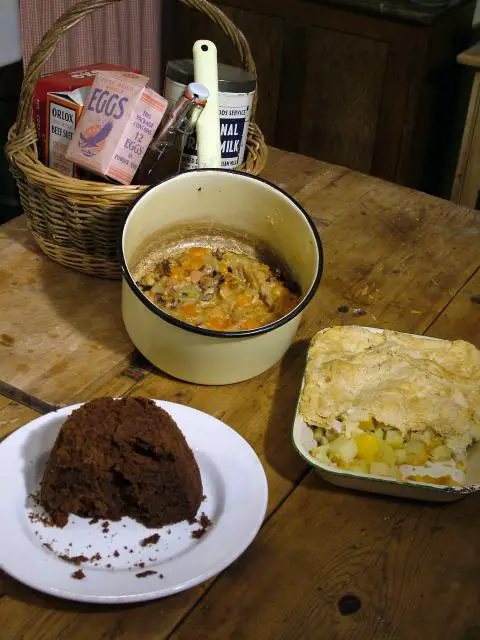Rationing in the Second World War meant that people had to be creative with the little food that was available to them. As such, almost every recipe had to be adapted to suit wartime conditions. Sugars and other sweeteners were in very short supply, so people were encouraged to use honey as a substitute. Here are some examples of recipes that would have been used between 1939 and 1945.
Rabbit Stew
Ingredients:
- 1 whole rabbit, cut into joints
- 1 tbsp vinegar
- 1oz flour
- salt & pepper
- 1-2oz dripping
- 2 bacon rashers, de-rinded & chopped (if available)
- 2 medium onions, sliced
- 3 medium carrots, sliced
- 1 pint (600ml) water or stock
- 1 cooking apple
- fresh herbs (as available)
Method:
- Put the rabbit to soak in cold water with the vinegar for 30 minutes
- Remove and dry well
- Mix the flour with the salt and pepper and coat the rabbit joints
- Heat the dripping and add the bacon rinds. Then add the rabbit joints and cook steadily for about 10 minutes or until golden brown in colour
- Remove from the pan
- Add the bacon, onions and carrots and cook for 5 minutes then return the rabbit to the pan
- Add the water or stock and the grated apple and stir as the liquid comes to the boil and thickens slightly
- Add the herbs
- Bring to the boil and simmer for 30 minutes
- Quickly put dish into the hay box and leave for 4 to 5 hours
- Serve with seasonal vegetables
Bread Pudding
Ingredients:
- 225g (8oz) stale bread
- 50g (2 oz) grated suet
- 25g (1 oz) sugar
- 1 tablespoon marmalade
- 50g (2oz) dried fruit
- 1 reconstituted dried egg
- milk to mix
- ground cinnamon
Method:
- Pre-heat the oven, Gas 4, 180C, 350F
- Put the bread into a basin, add cold water and leave for 15 minutes then squeeze dry with your fingers
- Crumble the bread to the basin
- Add all the other ingredients and enough milk to make a sticky consistency
- Add a pinch of cinnamon
- Spoon into a greased tin (20cm, 8″) and bake in the centre of the oven for 1 hour (or steam in a greased basin for 2 hours)
- Remove from the steamer or oven and allow to cool for 10 minutes
- Serve warm or cold
Prune Sponge
Ingredients:
- 8 oz. flour
- 1 oz. fat
- 1 tablespoon syrup
- ½ tablespoon mixed spice
- ½ teaspoon nutmeg
- ½ teaspoon bicarbonate of soda
- Salt
- Water or milk to mix
- 8-12 prunes
Method:
- Rub the fat into the dry ingredients and mix to a soft consistency with syrup and milk or water.
- Place the soaked stones prunes in the bottom of a greased basin, and pile the pudding mixture on top.
- Cover with a greased paper and steam for 1 ½ – 2 hours.
- Use the prune juice thickened with cornflour or custard powder as a sauce.
Woolton Pie (named after the Earl of Woolton – Minister for Food 1940-1943)
Ingredients:
- 1 lb diced potatoes
- 1 lb cauliflower
- 1 lb diced carrots
- 1 lb diced swede
- 3 spring onions
- 1 teaspoon vegetable extract
- 1 tablespoon oatmeal
- Small portion of chopped parsley
Method:
- Cook everything together with just enough water to cover, stirring often to prevent it sticking to the pan. Let the mixture cool.
- Spoon into a pie dish, sprinkle with chopped parsley.
- Cover with a crust of potatoes or wholemeal pastry.
- Bake in a moderate oven until golden brown.
- Serve hot with gravy.
Carrot Cookies
Ingredients:
- 1 tablespoon margarine
- 2 tablespoons sugar
- A few drops of vanilla or almond for flavouring
- 4 tablespoons grated raw carrot
- 6 tablespoons self-raising flour or plain flour mixed with ½ teaspoon of baking powder
- Extra sugar to sprinkle on top of the cookies.
Method:
- Cream the margarine and sugar together until light and fluffy.
- Beat in the flavouring and grated carrot.
- Fold in the flour, or flour mixed with baking power.
- Drop spoonfuls of the mixture into small greased patty pans.
- Sprinkle the tops with the extra sugar and bake at 220C, 425F, gas mark 7 for about 20 minutes.
Sources:
http://cookit.e2bn.org/historycookbook/1505-rabbit-stew.html
http://cookit.e2bn.org/historycookbook/743-bread-pudding.html
http://recipespastandpresent.org.uk/wartime2.php
http://www.historylearningsite.co.uk/recipes_world_war_two.htm
Link/cite this page
If you use any of the content on this page in your own work, please use the code below to cite this page as the source of the content.
Link will appear as World War 2 Recipes: https://worldwar2.org.uk - WorldWar2.org.uk, June 24, 2014
